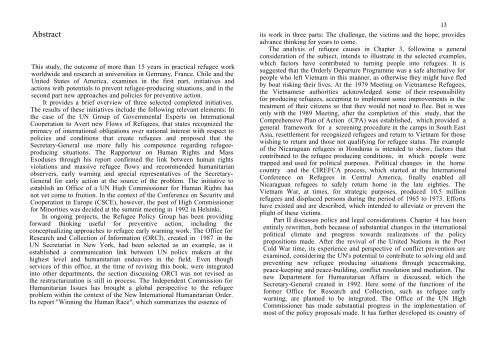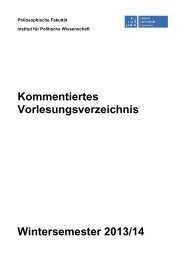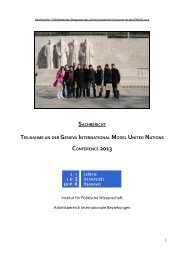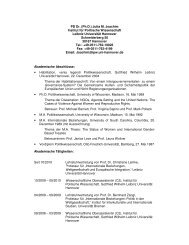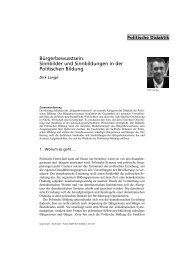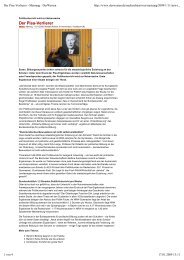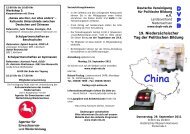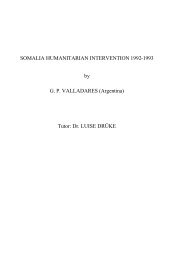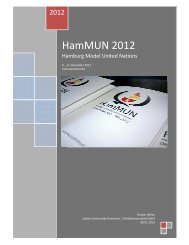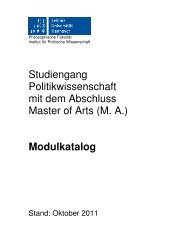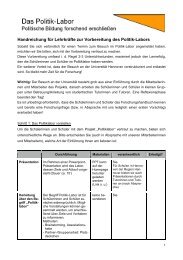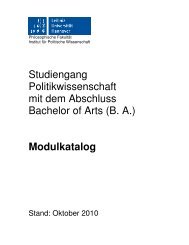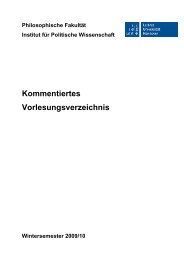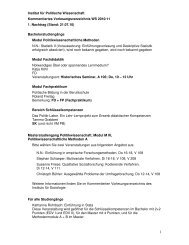Preventive Action for Refugee Producing Situations
Preventive Action for Refugee Producing Situations
Preventive Action for Refugee Producing Situations
You also want an ePaper? Increase the reach of your titles
YUMPU automatically turns print PDFs into web optimized ePapers that Google loves.
Abstract<br />
This study, the outcome of more than 15 years in practical refugee work<br />
worldwide and research at universities in Germany, France, Chile and the<br />
United States of America, examines in the first part, initiatives and<br />
actions with potentials to prevent refugee-producing situations, and in the<br />
second part new approaches and policies <strong>for</strong> preventive action.<br />
It provides a brief overview of three selected completed initiatives.<br />
The results of these initiatives include the following relevant elements: In<br />
the case of the UN Group of Governmental Experts on International<br />
Cooperation to Avert new Flows of <strong>Refugee</strong>s, that states recognized the<br />
primacy of international obligations over national interest with respect to<br />
policies and conditions that create refugees and proposed that the<br />
Secretary-General use more fully his competence regarding refugeeproducing<br />
situations. The Rapporteur on Human Rights and Mass<br />
Exoduses through his report confirmed the link between human rights<br />
violations and massive refugee flows and recommended humanitarian<br />
observers, early warning and special representatives of the Secretary-<br />
General <strong>for</strong> early action at the source of the problem. The initiative to<br />
establish an Office of a UN High Commissioner <strong>for</strong> Human Rights has<br />
not yet come to fruition. In the context of the Conference on Security and<br />
Cooperation in Europe (CSCE), however, the post of High Commissioner<br />
<strong>for</strong> Minorities was decided at the summit meeting in 1992 in Helsinki.<br />
In ongoing projects, the <strong>Refugee</strong> Policy Group has been providing<br />
<strong>for</strong>ward thinking useful <strong>for</strong> preventive action, including the<br />
conceptualizing approaches to refugee early warning work. The Office <strong>for</strong><br />
Research and Collection of In<strong>for</strong>mation (ORCI), created in 1987 in the<br />
UN Secretariat in New York, had been selected as an example, as it<br />
established a communication link between UN policy makers at the<br />
highest level and humanitarian endeavors in the field. Even though<br />
services of this office, at the time of revising this book, were integrated<br />
into other departments, the section discussing ORCI was not revised as<br />
the restructurization is still in process. The Independent Commission <strong>for</strong><br />
Humanitarian Issues has brought a global perspective to the refugee<br />
problem within the context of the New International Humanitarian Order.<br />
Its report "Winning the Human Race", which summarizes the essence of<br />
its work in three parts: The challenge, the victims and the hope, provides<br />
advance thinking <strong>for</strong> years to come.<br />
The analysis of refugee causes in Chapter 3, following a general<br />
consideration of the subject, intends to illustrate in the selected examples,<br />
which factors have contributed to turning people into refugees. It is<br />
suggested that the Orderly Departure Programme was a safe alternative <strong>for</strong><br />
people who left Vietnam in this manner, as otherwise they might have fled<br />
by boat risking their lives. At the 1979 Meeting on Vietnamese <strong>Refugee</strong>s,<br />
the Vietnamese authorities acknowledged some of their responsibility<br />
<strong>for</strong> producing refugees, accepting to implement some improvements in the<br />
treatment of their citizens so that they would not need to flee. But is was<br />
only with the 1989 Meeting, after the completion of this study, that the<br />
Comprehensive Plan of <strong>Action</strong> (CPA) was established, which provided a<br />
general framework <strong>for</strong> a screening procedure in the camps in South East<br />
Asia, resettlement <strong>for</strong> recognized refugees and return to Vietnam <strong>for</strong> those<br />
wishing to return and those not qualifying <strong>for</strong> refugee status. The example<br />
of the Nicaraguan refugees in Honduras is intended to show, factors that<br />
contributed to the refugee producing conditions, in which people were<br />
trapped and used <strong>for</strong> political purposes. Political changes in the home<br />
country and the CIREFCA process, which started at the International<br />
Conference on <strong>Refugee</strong>s in Central America, finally enabled all<br />
Nicaraguan refugees to safely return home in the late eighties. The<br />
Vietnam War, at times, <strong>for</strong> strategic purposes, produced 10.5 million<br />
refugees and displaced persons during the period of 1965 to 1973. Ef<strong>for</strong>ts<br />
have existed and are described, which intended to alleviate or prevent the<br />
plight of these victims.<br />
Part II discusses policy and legal considerations. Chapter 4 has been<br />
entirely rewritten, both because of substantial changes in the international<br />
political climate and progress towards realizations of the policy<br />
propositions made. After the revival of the United Nations in the Post<br />
Cold War time, its experience and perspective of conflict prevention are<br />
examined, considering the UN's potential to contribute to solving old and<br />
preventing new refugee producing situations through peacemaking,<br />
peace-keeping and peace-building, conflict resolution and mediation. The<br />
new Department <strong>for</strong> Humanitarian Affairs is discussed, which the<br />
Secretary-General created in 1992. Here some of the functions of the<br />
<strong>for</strong>mer Office <strong>for</strong> Research and Collection, such as refugee early<br />
warning, are planned to be integrated. The Office of the UN High<br />
Commissioner has made substantial progress in the implementation of<br />
most of the policy proposals made. It has further developed its country of<br />
13


